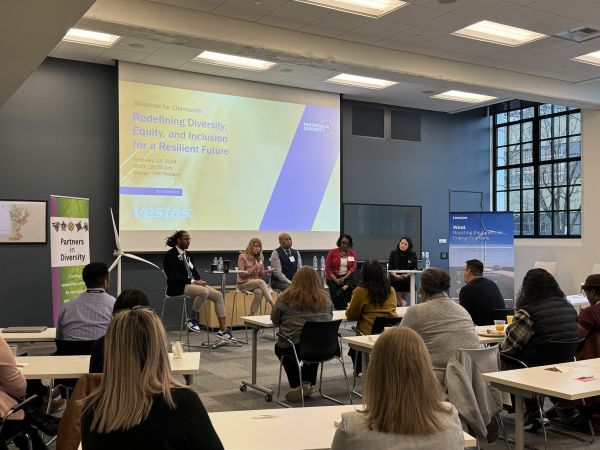The Importance of Learning, Unlearning, and Re-Learning
February 28, 2024 – Earlier this month, we hosted our first Breakfast for Champions session of the year at Vestas in NW Portland. With the continued wave of anti-DEI sentiments and policies making local and national headlines, we gathered a panel of local leaders from various sectors to discuss how to move forward with our DEI initiatives and continue to pursue our inclusion goals amidst the changing landscape. The session highlighted several key strategies and perspectives:
- Focus your energy on the work, not the term: As the “DEI” term continues to be politicized in the public sphere, it’s important to remember that an organization’s energy should be focused on impact and results rather than just marketing its DEI intentions and plans. The real work often takes place behind closed doors so whether you choose to publicly use the DEI term or not, your impact will be clearly communicated in your annual impact report or your organization’s data.
- Learn, unlearn, and re-learn: Like any organizational goal, it’s important to set metrics and create a plan for our DEI initiatives. Sometimes our original action plan will lead us to great results, and sometimes, it just won’t work. Exploring other approaches and considering other perspectives is crucial when we aren’t seeing the progress we expect. Trying new approaches and borrowing strategies from other practitioners and organizations can not only increase our probability of success but also nurtures the momentum of our work and keeps us moving towards our goals.
- Know when to call people in and when to call people out: One repercussion many of us are seeing from the passing of anti-DEI legislation is an increase of division among communities and harmful words and behaviors making their way into DEI centered workplace conversations. Sometimes these words or behaviors can be caused by true differences in lived experiences between individuals and sometimes they aim to cause harm. To maintain a healthy line of communication when discussing difficult topics and preventing our differing experiences from hijacking our progress, it’s important to know when to call individuals into a conversation and when to call out behavior or words that are clearly harmful. If a colleague makes a comment that doesn’t sit right with you, it’s important to decide if a one-on-one check-in or an official harassment report will be more effective in addressing the situation. Click here for a quick guide on “Calling In and Calling Out” from the Harvard Diversity, Inclusion, and Belonging Center.
We all come with our own lived experiences and have different expectations about what the workplace should be and what it shouldn’t be. We encourage you to continue advocating for yourself and your communities and leading with the idea that the journey towards a more inclusive workplace and community is an ongoing process. It requires a genuine commitment, open dialogue, and a willingness to collaborate with others. If you missed our Breakfast for Champions session, please visit our website to keep up with our upcoming sessions and other educations events. A special thank you to Vestas for sponsoring this month’s Breakfast for Champions session.


